- Home
- Carrie Summers
Nightforged (Shattering of the Nocturnai Book 1) Page 6
Nightforged (Shattering of the Nocturnai Book 1) Read online
Page 6
I punched him in the shoulder. “Don’t worry—”
A high-pitched laugh cut me off. The cabin boy, Makal, sat atop a nearby barrel. He kicked his heels against the staves, creating hollow thuds when they landed.
“Lilik and her lover are all made up,” he said. “Better kissy-kiss now.”
“Go fold your daddy’s clothes, Makal.” When Paono stepped toward him, Makal scampered away. He caught hold of a rope ladder and clambered into the nest of rigging.
I watched him go. How much of our conversation had he listened in on? If the rumor got back to the traders that Paono was jealous of Raav, they'd die of laughter. I still hadn’t told Paono about my trunk getting emptied. We’d talked so little. I wondered if he’d been mistreated as well.
“No one’s been messing with you have they, Paono?”
“What do you mean?”
I hesitated, but then told him the story.
“Nothing like that?” I asked after I finished. “No rotten food in your bed? Nobody dragging your things out of your trunk?”
He chewed at a hangnail. “Depends on whether you count the knife slashes in my padded jackets. Or people kicking my knees from behind when there’s a crowd.”
“Rot. I’m sorry, Paono,” I said. “We should have talked about this earlier. Listen, there’s nothing that says a caller can’t watch her sentinel’s back, too. From now on, we guard each other, okay?”
“It’ll get easier when we get to Ioene,” he said. “People are bored. Traders mistake cruelty for entertainment.”
“I hope you’re right.”
The torchlight glinted off his eyes while he watched the dancing flame. “Hey Lilik, there’s something else I’ve wanted to tell you.”
“What’s that?”
“Before you invited me, I’d never considered the Nocturnai.”
“What? Really?” I tried to think back. Hadn’t we always talked about it together?
He shrugged. “I like Istanik. I probably would have been happy to spend my whole life around the port.”
My brows drew together. For years, Paono and I had talked about this. He’d said he dreamed about Ioene. Had he made it all up?
“But what about all our talks?”
His smile was melancholy. “I guess I wanted to fit in with you.”
“We’ve been friends forever. How do you fit in with one person?”
“That’s just it, Lilik. You just kind of sweep people along—if they can keep up at all.”
“So you don’t want to be here? You lied all this time?”
He shrugged, then nodded. “But I wanted to say that I’m glad I’m here now. The stars are beautiful. And I’m with my best friend. My other half.”
Except we weren’t at all as alike as I’d thought. He’d be happy catching crabs or weaving ropes or doing whatever boring, back-breaking work he could scrounge up. Meanwhile, my future as an egg-seller had felt like I was locked in a tiny room with no doors.
I chewed my lip, feeling adrift with no sails. I couldn’t be mad at Paono—he’d only been fibbing to stay close to me. Because he needed a friend, I guess. But I’d dragged him up here, into danger he wanted no part of, all based on a lie.
The night didn’t seem so beautiful anymore.
“Well, I’m happy that you don’t hate it here,” I said.
He smiled, pulling me into a quick hug. “I don’t. And I never would have come if you hadn’t invited me. So thanks again.”
Beneath my shirt, Paono’s pendant jabbed my breastbone, uncomfortable. I looked at the sky, seeking the wonder I’d felt just minutes before, but all I saw were the stars glaring down at me.
Paono’s confession about the Nocturnai was a glass wall between us. I wanted to smash it and go back to the way we were. But every time I decided to go talk to him, I’d see him coiling rope or inventorying supplies, and I’d remember that simple things were all he wanted out of life. A stranger lived inside my best friend.
Often, I noticed my hand creeping for the sea opal pendant. Maybe I shouldn’t wear it anymore.
Captain Altak had warned us to eat well before we left Istanik. In the constant darkness, I finally appreciated his words. Without a sunrise, the cooks didn’t bother making the meals distinct. Instead, they threw everything together into a sticky mass of porridge dotted with dried vegetables and meat that turned to slime when rehydrated.
I was testing whether a glob would stick to an upside-down spoon when Raav sat down across from me. I jerked and plunged my spoon into the gray mess. Did traders play with their food? I blushed.
“Good morning,” he said. His keen gaze gave the sense that he was examining me, a trader assessing a trade good. When I fidgeted under his scrutiny, he chuckled.
I quickly straightened; I wouldn’t be intimidated by him, trader or not. Handsome trader or not.
“I’m not sure I’d call it ‘good’ with this for breakfast,” I said.
He laughed. “No. And to think, back home I used to be a morning person. Couldn’t wait to see what surprises the day had ready for me.”
Unlike Paono, who didn’t want to contend with surprises or adventure. I nearly winced at the thought. I shouldn’t be so critical. How many people had friends as dependable—as predictable—as he was?
I plugged a gob of porridge into my mouth and swallowed with some difficulty before speaking. “So what do traders do in the morning besides sit around and eat?”
He laughed, a sound like quick, low notes tugged from a cello’s strings.
“Before or after our servants finish washing our feet?”
“You’re joking, right?”
A smirk teased the corner of his mouth. “Mostly. Though there are some . . .”
“You mean . . . some traders actually hire foot washers? Gross.”
“Someone to help them in the bath, actually.”
My lip curled. “Isn’t that sort of a private moment?”
“I like to think so.” Raav’s stare arrowed into me. “Though I suppose it would depend on the company . . .”
My face went hot. Blinking, I turned to the porthole beside our table. Beneath a flickering, red lamp, it peered out over dark waves, a hint of starlight brushing over their crests. Swallowing, I tapped my toes on the floor and turned back to him.
Raav chuckled.
Chapter Eleven
AS WE APPROACHED Ioene, spirits were high. Crewmen stopped muttering about the threat of night madness. Even my worries about Moanet’s figurine had started to fade.
One night, the air was warm enough that I nestled on deck to enjoy the sea breeze before heading to my bunk.
Trails of aquamarine glow, phosphorescent algae, swirled in eddies cut by the oars. Above, the aurora echoed the display, shimmering green and blue across the starscape. The sails had long been furled because few breezes stirred above the night line, and the masts were dark spears aimed at the heavens. I wore my fur overcoat now. My breath steamed, ghostly in the starlight. Only the splash of the oars broke the night’s calm. Farther astern, Captain Altak manned the wheel. He squinted at the compass, occasionally tugging a rope that rang a bell below, informing the oarsmen to pull harder on one side.
The night air was so crisp, I heard the squeak from the captain’s throat when he yawned. If not for the chill, the gentle splashing and the pull of the oars might have lulled me to sleep.
Deep in the pocket of my overcoat, I wrapped my hand around the figurine’s obsidian curve. Time for bed. I inhaled cold sea air and summoned the energy to stand.
A sharp yelp rang across the deck. “Land ahead!”
Excitement raced through me. Finally! There, on the horizon, dull red lines glowed on a hulking shadow: the volcano, Ioene. A cloud hung above the mountain’s cone, its underbelly reddened by the fires. Sparks danced in the ash.
“Ship the oars and rouse the crew,” Captain Altak called. “We’ll prepare for the shoals.”
I clambered atop a pile of coiled lines at th
e base of the mainmast and crouched. Around Ioene’s shores, jagged ridges of hardened lava lurked in the shallows. The island itself had a safe harbor and a pier older than memory, but reaching it remained one of the voyage’s most dangerous challenges.
While the crewmembers huddled on the aft deck, I stared at Ioene. Since I was a little girl learning to read in a basement storeroom with other destitute children, I’d dreamed of this mountain. This voyage. I pulled the carving from my pocket, hand wrapped tight around the object that had made it possible.
“Caller! Lilik!”
I jumped up.
“No one but crew on deck. Get below.” Captain Altak commanded the scene from atop a crate. He carried a spyglass in one hand.
“Yes, Captain.”
My shoulders slumped—I’d hoped to watch our approach—but I wouldn't disobey the captain's orders. As I shimmied along the rail, bound for the forward hatch, a crewman rushed past. His elbow slammed my shoulder. My thigh hit the rail, and I overbalanced, windmilling my arms to recover.
“Get below, gutter rat!” The man spun, and the coil of rope he carried swung into my flailing arm. My hand smashed the rail. The figurine tumbled from my grasp and landed on the deck, skittering along the rail a hand’s width from the edge.
“No!” I dove, and my fingers brushed the carving’s cool stone as my face slammed the planks.
Crawling like a terrified piglet, I chased the figurine across the slippery deck. Abruptly, my coat collar cinched tight around my throat, choking me. The figurine slid farther away as I kicked my feet and clawed at the deck, not understanding why I'd stopped moving. I gagged as someone yanked the coat, lifting me to my feet.
“What’s the—are you night mad?” The crewman who'd knocked me said. My coat twisted around his fist.
I wrenched away from him and scrambled forward, desperate for the figurine.
It had vanished. Gone overboard or been kicked into a tangle of netting. My stomach heaved.
But then I spied a glint. My breath whooshed out in a relieved gust. The carving teetered at the deck’s edge, feet wedged against one rail post, flowing hair against the other. If anyone brushed it, they’d knock it into the sea.
I leaped, tumbled forward, and closed my fingers around the cool stone. Clutching it to my chest, I rolled.
“Ridge dead ahead! To port! Grab the poles—push us off!” The captain’s voice boomed. Crewmen sprinted back and forth, jumping over me, cursing and snarling.
Light exploded, a starburst of sparks. Pain stabbed my temple.
I remember nothing else.
Chapter Twelve
I HEARD VOICES. Words. Nothing made sense.
“We’re here for two months. If she recovers quickly, she can still call the strands.”
“Panicked like a fool. Clumsy. She’ll ruin the Nocturnai and I’ll be back to prying hunks of ore out of Araokan holes.”
“Then what would . . .”
The sounds faded, crunching footsteps retreating.
Beneath the blanket—was I in bed?—my legs were bare. Warm, humid air flowed into my lungs, reminding me of rainy nights I huddled by the fire with Jaret.
Warm, not cold. I remembered being cold.
Later, more people spoke, words rattling in my skull. I shifted, sending a spear of agony through one ear and out the other.
“She’s waking up.” I recognized the voice, but from where? Makal. The name drifted across my thoughts.
“Good. I hope she has a headache.” Mieshk or Laiska, her sentinel—they sounded so alike. Memories trickled back.
“Lilik . . .” Low purr of a voice. Raav? Recollections poured in. I’d scrambled to catch the figurine and then . . .
I sat bolt upright, snapping my eyes open. Bile surged into my throat with the white pain in my skull. Frantic, I swallowed, forcing the pain back far enough I could think.
Dizzied, I took in my surroundings. I was sitting on a cot on the black-rock beach. Surrounding the area, torches burned, and behind, the mountain glowed where lava oozed down her flanks. The scene wavered. My stomach turned over.
“You’ve hit your head, Lilik. Do you know where you are?”
Tkira, the second mate, pressed me back to the pillow. Her rough palms snagged on the fabric of my shirt—crewing the Evaeni was hard work, even for a captain’s mate. I stiffened, remembering her reaction to the stowaway, how Tkira had pressed for his execution.
Whoever had put me here had removed my heavy trousers and fur overcoat. I pawed around under the covers. No figurine.
“Lilik?” Raav’s face bent over mine.
“Ioene . . . we made it. Where are my clothes? I had my—I had a carving that belonged to my mother.”
“Your coat's in your trunk.” Tkira pointed with her chin. “Still on board. Didn't see any carving.”
Because it fell into the sea. I clenched my fists, fighting rising panic.
Crouching, Raav laid a hand on my shoulder. “Shh. We’ll find it.”
My eyes flitted back and forth, desperate. Stay calm, Lilik. I crammed the reassurance into my thoughts. My memories were fuzzy—maybe I’d stuffed the figurine into my pocket before the accident. Moist air tickled my nostrils as I forced myself to inhale.
Raav nodded. “Better.” After a reassuring pat, he stood. “I should help set up.”
Nodding, I scanned the harbor water. The Evaeni floated in placid waters, lashed to a pier, deck empty of crew. Farther along the shoreline, a lava flow hissed into the sea, raising a cloud of red steam. Warm, acrid air from the volcano’s vents mixed with the scents of dark-blooming kivi flowers and the ocean’s cool salt-tang. On the beach, a group of crewmen stacked and restacked crates, organizing the cargo for the move into the village.
“Idiot,” one of them said without bothering to lower his voice. “Gutterborn girl couldn’t stay out of the way. Got herself hurt and now we’re short a nightcaller.”
“Another word and you’re on double shifts,” Tkira snapped. Turning to me, she lowered her voice. “You cost us plenty of effort, getting you off the deck and into a bunk just when we needed to deal with the shoals.”
“I’m sorry, I—”
“You’re forgiven.” Her voice was soft considering the cruel-looking twist of her face. I still didn’t trust her. “I saw you heading below when Engotav knocked you. But don’t expect the crew's forgiveness until you’re up and calling the strands. Everyone is counting on you.”
Yeah. I swallowed. I really needed to check those coat pockets.
“When they bring my trunk ashore, can they leave it here?” I asked. “I feel chilled.”
She laid her hand, knuckles the size of walnuts, against my forehead. “Probably your injury.”
Another wool blanket settled over me, its comforting weight pressing me into the cot. Tkira’s kindness took me off guard. Scanning the beach, I wondered where Paono was. Did he even know what had happened? Or maybe he knew and had decided not to stay with me.
I dug my fingers into the thin mattress. Maybe that was better. If I couldn’t call the strands, he might be punished, too.
Unless, maybe, I turned myself in. Told the truth.
I shook my head. Most likely, he’d join me on the gallows no matter what I said.
Behind me, the volcano growled, red glow flaring. I closed my eyes against the sting of ashes.
I didn’t want to die.
Traitors to the Nocturnai are executed.
I couldn’t help remembering Moanet’s words while I paced the confines of my hut. The others had carried me from the beach while I slept. It had been a day since, and I’d searched my belongings at least ten times. The figurine was gone.
Constructed of mortared stone, my hut had a single window and door. I’d pulled a blanket from the bed, snagging it on the rough-cut corners of the window frame as a makeshift curtain. The door had no lock, so I’d wedged a chair beneath the knob. It wouldn’t keep out a determined intruder, but I was less likely to be surprised b
y a casual visitor.
Turning when I reached the wall, I stalked in the opposite direction. Back and forth. Back and forth. The blow to the head excused me from the first calling shift, but my lies would be unearthed soon enough.
I had to do something, but I’d discarded every option but one: escape.
Remaining meant my death. Possibly Paono’s, too. But I could leave, and no one would know about the figurine. They’d assume I got lost. Fell into the ocean. I was just a gutterborn, after all. Most voyagers would expect me to do something stupid.
It meant surviving, alone, on Ioene. But it meant surviving.
Rooting through my trunk, I laid supplies on top of my cot. Two changes of clothes, thin linen shifts, loose trousers, and belted tunics to go over the top. A warm coat. My extra pair of shoes. I needed a way to carry it all, so I dug out my sewing kit and laid it beside my spare cloak. After so many years of making and repairing my own clothes, it should be straightforward to create a rucksack from the cloak’s fabric and ties.
I paused to look over my preparations and made a mental list of extra things I needed to gather. My sewing kit included only needles and thread—I’d need scissors to cut the cloak. Or better—more versatile—a knife. I shouldn’t leave without a water skin, plus food to last me until I could put my foraging knowledge to work. Those three things could come from the dining hall—I doubted anyone would notice me leaving with extra. But as for torch-making supplies—rags and lamp oil—that would require some thought. Most likely, I’d have to sneak into one of the storage buildings.
All right. I’d done what I could for the moment. Inhaling, I removed the chair from beneath the doorknob and stepped outside. A simple bench stood on my porch. Taking a seat, I wrapped a blanket around my shoulders to keep up the injured act. By watching the crew prepare the village, I’d find out where various supplies were stored, maybe even gather ideas for other items I needed.
The village perched above the beach on a jut of rock and earth. Though night foliage choked much of the island, a tangle of springy, scratching branches prickling with leaves so dark they were nearly black, the subterranean lines of heat that fed the thickets veered around the outcrop, leaving the earth bare. Plants that had taken root in the daylight had long since withered. A few dry stalks threaded between the floorboards of my narrow porch, casting thin-armed shadows in the flickering light of nearby lamps.

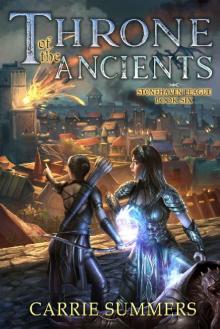 Throne of the Ancients: A LitRPG Adventure (Stonehaven League Book 6)
Throne of the Ancients: A LitRPG Adventure (Stonehaven League Book 6)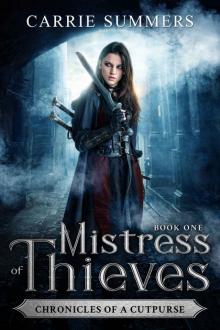 Mistress of Thieves (Chronicles of a Cutpurse Book 1)
Mistress of Thieves (Chronicles of a Cutpurse Book 1) Shattering of the Nocturnai Box Set
Shattering of the Nocturnai Box Set Empress of Rogues
Empress of Rogues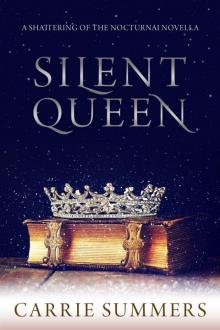 Silent Queen
Silent Queen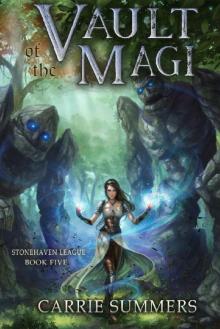 Vault of the Magi: A LitRPG Adventure (Stonehaven League Book 5)
Vault of the Magi: A LitRPG Adventure (Stonehaven League Book 5) Heart of the Empire (The Broken Lands Book 1)
Heart of the Empire (The Broken Lands Book 1)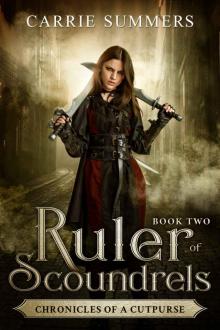 Ruler of Scoundrels (Chronicles of a Cutpurse Book 2)
Ruler of Scoundrels (Chronicles of a Cutpurse Book 2)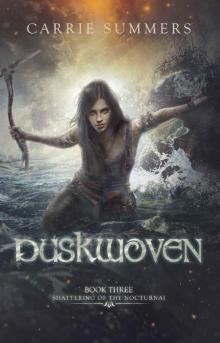 Duskwoven
Duskwoven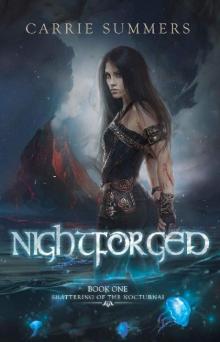 Nightforged (Shattering of the Nocturnai Book 1)
Nightforged (Shattering of the Nocturnai Book 1)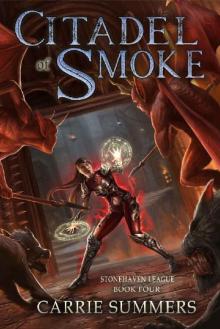 Citadel of Smoke: A LitRPG and GameLit Adventure (Stonehaven League Book 4)
Citadel of Smoke: A LitRPG and GameLit Adventure (Stonehaven League Book 4) Temple of Sorrow: A LitRPG and GameLit Adventure (Stonehaven League Book 1)
Temple of Sorrow: A LitRPG and GameLit Adventure (Stonehaven League Book 1)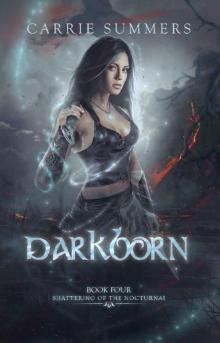 Darkborn (Shattering of the Nocturnai Book 4)
Darkborn (Shattering of the Nocturnai Book 4)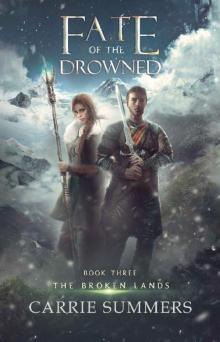 Fate of the Drowned (The Broken Lands Book 3)
Fate of the Drowned (The Broken Lands Book 3)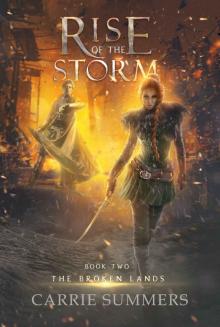 Rise of the Storm
Rise of the Storm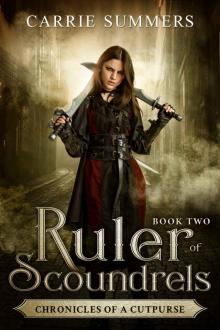 Ruler of Scoundrels
Ruler of Scoundrels Shadowbound
Shadowbound